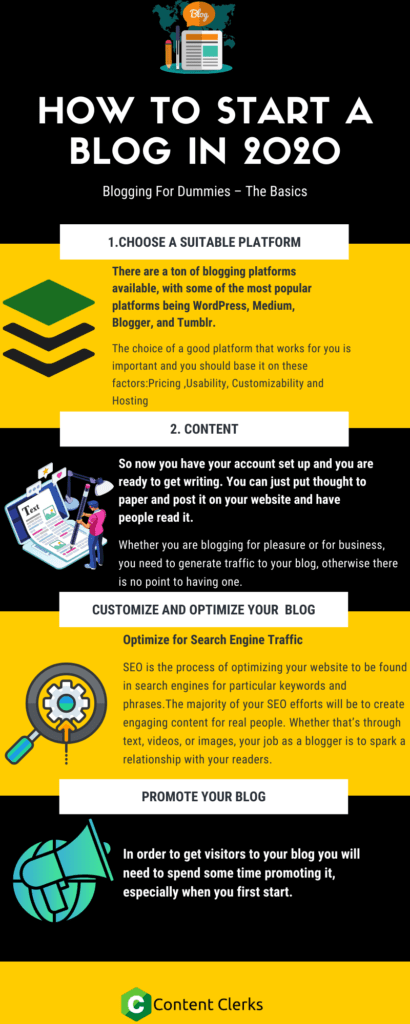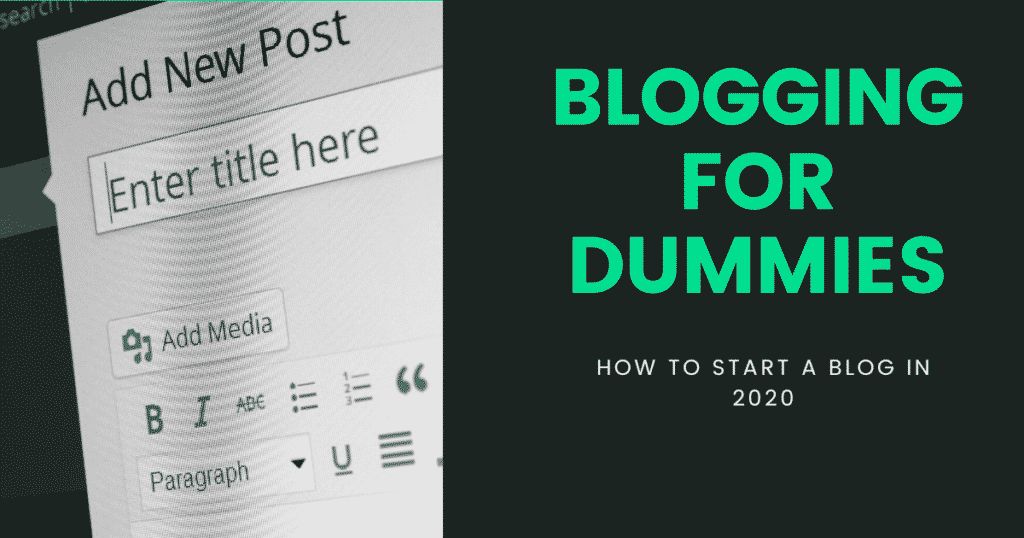What is blogging for dummies exactly? Who should read this article? Well, there is only one way to find out.
Do you have any knowledge that you feel you need to pass on to the world, maybe about fashion or dieting, car maintenance, or even how to survive college?
Or maybe you have an idea of affiliate marketing as a business and you want to educate and make some money as well?
Which is the best way to do any of these?
The best way to do this is through blogging.
Blogging for beginners can seem a daunting task. Fear not! We will break down all the things you need to know about how to start a blog, including all the beginner’s mistakes you should avoid.
By the end of this article, you will feel confident to wander into the unknown that is the blogosphere and start your own blog. If you still cannot write your own content, you can try our bulk ordering service.
→Download Now: Free Blog Post Format Template
Blogging For Dummies – The Basics
Choose a suitable platform
You probably know that there are a ton of blogging platforms available, with some of the most popular platforms being Wordpress, Medium, Blogger, and Tumblr.
The choice of a good platform that works for you is important and you should base it on these factors:
- Pricing
- Usability
- Customizability
- Hosting
Pricing
Some blogging platforms are free while others have a payment plan. The free ones are best for a beginner because you can focus on building an audience without worrying about where to get money to pay for the platform.
However, there are definite benefits to using a paying platform. In the end, your choice should be determined by the goal of your blog and your budget.
Usability
Usability is a must-have feature in blogging for beginners. Blogging for dummies should not be complicated because you probably do not have the time or technical know-how to try and figure out how to use a complicated blogging interface.
Having said that…
If you are just learning how to start a blog, pick a platform with a great user interface. This way even if you do not possess technical skills like coding or web design, you can still get your blog going.

Customizability
You definitely do not want a platform that gives your work the same look as another’s.
A customizable platform helps you inject your own unique style in the layout of the site and content.
Hosting
Platforms like Medium do the hosting for you, which means that you churn out content and they take care of putting it out on the internet.
However, when you use a blogging platform that also takes care of hosting, you have to use their domain name.
Not so cool, right? Here’s another downside.
Since you are using their hosting services and domain name, the site monitors the content you put out.
Also, you do not really own the content if a platform is hosting it for you. Even if you deactivate your account with them, your content can still be found on the platform.
Self-hosting gives you a ton of possibilities, including complete ownership of your content and the ability to pick your own domain name.
You can post any type of content freely without fear of being restricted. The only downside is that you have to pay for a hosting service. This does not cost much; most of the time you’ll only have to pay around $5 to $10 a month.
There are many hosting sites with different payment plans so you can pick the one most suited to your budget.
Content
So now you have your account set up and you are ready to get writing. You can just put thought to paper and post it on your website and have people read it.
If you take this route though, you will probably have your friends and family as your long-term readers.
Whether you are blogging for pleasure or for business, you need to generate traffic to your blog, otherwise there is no point to having one.
So how do you start a blog and grow your readership from just a few people to thousands? Let us look at some blogging for dummies dos and don’ts.
Do: Know your endgame
Don’t: Write without a goal in mind
Why do you want to write a blog? Are you an avid traveler looking to share details about the places you visit?
Do you have some technical skills, in fields like coding or web design, that you want to pass on through your blog?
Maybe you just want to promote your website or business online by writing articles.
Whatever your aim, you need to understand what the goal of your blog is because this will help gear your content toward that goal.
Do: Write what you know
Don’t: Give fake knowledge
Look,
If you write about something you are not passionate about or have no knowledge of, your readers can tell. Whether it is factual inaccuracies, an unnatural tone or, or just a piece that reads wrong, you will not be able to fool a reader for long.
And once you get a reputation of being a fraud, it is incredibly difficult to wear that off. Make sure you are conversant with a topic before venturing into it. You do not have to be an expert on a subject matter in order to get it right.
Do not take for granted the value of doing research even when writing about something you know about.
If writing is not your strongest suit, you can consider hiring someone to do the writing for you.
Do: Write something your audience cares about
Don’t: Try to carve out a new niche
You might think that what is interesting to you will be interesting to your audience, but that is a mistake. Before you start on that piece that you think is oh so interesting, conduct a search to find out how many people are interested in reading content on the same.
Ironically,
The best niche to pick and write content on is one that already has a lot of blogs on it. This gives your blog a better chance of success because it means people want to read stuff within that niche.
Do: Write quality content
Don’t: Churn out half-baked pieces
This is a no-brainier.
Nobody is going to want to read a piece that is poorly put together with no natural flow of ideas. No matter what your goal is or which subject you are writing on, make sure that you apply blogging best practices like using the right length of titles, using listicles, and incorporating keywords into your piece.
Take your time and plan out topics you want to address. This way you will not post a blog just to say something, but rather you will write something that readers look forward to devouring.
Do: Be consistent
Don’t: Blog only when you feel like it
Blogging as a beginner requires a lot of patience; you will not get it right on your first blog post. The key to becoming a master at anything is being consistent, and that is true with blogging too.
Even when your first few posts get very little readership, keep at it. With consistency, you will become a natural at crafting the right length of titles, incorporating SEO keywords naturally throughout your posts and keeping to the subject of your topic.
And with that, your readership will grow.
In Conclusion…
Blogging for dummies is not something difficult that you have to take a class to master. You can learn on the job, practicing the dos and don’ts as you go along.
Nobody starts out as an expert, so do not let your inexperience deter you from blogging. As long as you have your platform and hosting needs taken care of, and you have your content outlined, you are good to go!

Share this Infographic with Your Audience
How do I start a blog for dummies?
It is really simple. Pick up a blog niche, blog name, get your blog online, create content, customize your blog and then promote your blog.
How do you start your own blog for free?
You just have to Pick up a blog niche, blog name, get your blog online, create content, customize your blog and then promote your blog.
How much does it cost to start a blog?
Depending on the type of blog that you want to start.It will cost around $34.50-$65.40.

